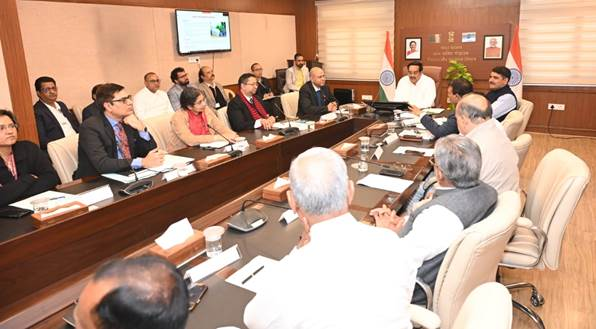C R Patil Leads Push for Gujarat’s Green Energy Revolution Through CBG Production
Gujarat aims to lead India’s green energy initiatives with 20+ CBG plants and innovative waste-to-energy models in the dairy sector under the GOBARdhan initiative.

- Country:
- India
In a landmark effort to promote renewable energy and sustainability, Union Minister for Jal Shakti, Shri C R Patil, convened a meeting with Chairpersons and Managing Directors of Gujarat's milk cooperatives and dairies to accelerate the establishment of Compressed Biogas (CBG) plants. This initiative will transform cattle dung and organic waste into sustainable energy and organic manure, aligning with the government's "waste to wealth" vision.
Highlighting the pivotal role of the dairy sector, Shri Patil emphasized that converting organic waste into CBG offers environmental and economic benefits, including reducing carbon emissions and creating self-sustaining rural energy models.
“India's dairy sector has long been a cornerstone of rural livelihoods,” Shri Patil said. “By embracing green technologies like CBG production, we not only lower our carbon footprint but also provide new revenue streams for farmers and cooperatives. This also enables access to carbon credits, fostering economic growth while supporting climate change mitigation.”
Gujarat’s Tremendous Potential for CBG Production
With a bovine population of 2.01 crore, Gujarat generates approximately 2 lakh tons of cattle dung daily, which can yield an estimated 4,000 tonnes of CBG per day. This positions the state as a leader in India’s renewable energy sector, offering immense opportunities for economic growth and green energy adoption.
Key Outcomes from the Meeting
The meeting focused on practical steps to harness Gujarat’s potential for bio-CBG production, including:
- Leveraging dairy waste: Utilizing cattle dung and other organic materials to produce bio-CBG efficiently.
- Public-Private Partnerships (PPPs): Exploring collaborations with cooperatives, private entities, and government agencies for funding, technology transfer, and operational management.
- Financial support under government schemes: Commitment to assist stakeholders through existing bio-energy initiatives, including the GOBARdhan (Galvanizing Organic Bio-Agro Resources Dhan) program.
- Model state vision: Establishing Gujarat as a trailblazer for clean energy practices in the dairy sector.
A significant commitment was made to establish:
- Over 20 large-scale CBG plants across Gujarat.
- 30,000 individual biogas units for rural households, requiring an investment exceeding ₹1,000 crore.
These initiatives aim to position Gujarat as a model state for sustainable energy, benefitting farmers, cooperatives, and the environment alike.
GOBARdhan Initiative and Government Support
Senior officials from the Department of Fertilizers, Department of Animal Husbandry, Ministry of New & Renewable Energy, and Ministry of Petroleum and Natural Gas participated in the meeting. They reiterated the government’s commitment to providing:
- Technical guidance to enhance efficiency in CBG production.
- Financial incentives and subsidies to reduce upfront costs.
- Support for integrated infrastructure development in the renewable energy space.
These efforts align with the broader objectives of the GOBARdhan initiative, designed to boost rural economies by transforming organic waste into valuable resources.
Stakeholders Pledge Support
Leaders from cooperatives and dairies expressed enthusiastic support for the initiative. Shri Patil urged all stakeholders to work collaboratively to achieve India’s energy self-reliance goals, while advancing the country’s renewable energy commitments.
JSW Cement CEO highlighted the importance of such initiatives: “Collaborations between government and cooperatives in renewable energy will create lasting impacts for rural areas, empowering farmers while addressing global climate change concerns.”
A Vision for the Future
This initiative underscores India’s dedication to a sustainable future, where renewable energy and waste-to-wealth models serve as cornerstones of rural development. By investing in innovative green technologies, Gujarat is set to lead the way in achieving the government’s ambitious goals for energy independence and environmental stewardship.
Shri Patil concluded by affirming the government’s steadfast commitment: “This initiative is not just about energy production—it’s about creating a healthier, wealthier, and more sustainable India.”
- READ MORE ON:
- C R Patil
- Compressed Biogas










